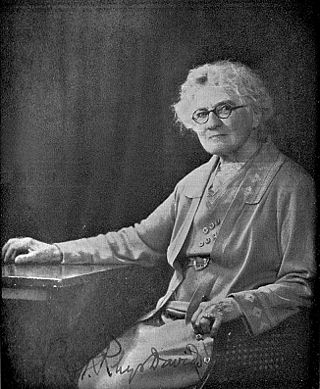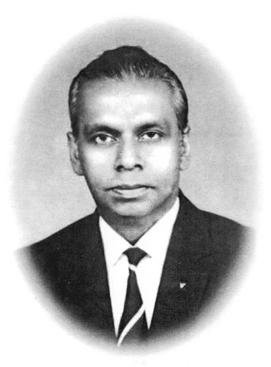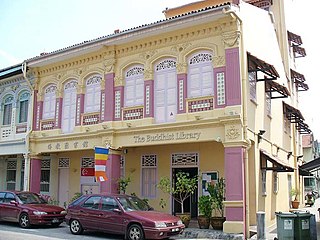
Caroline Augusta Foley Rhys Davids (1857–1942) was a British writer and translator. She made a contribution to economics before becoming widely known as an editor, translator, and interpreter of Buddhist texts in the Pāli language. She was honorary secretary of the Pāli Text Society from 1907, and its president from 1923 to 1942.

Bhikkhu Bodhi, born Jeffrey Block, is an American Theravada Buddhist monk ordained in Sri Lanka. He teaches in the New York and New Jersey area. He was appointed the second president of the Buddhist Publication Society and has edited and authored several publications grounded in the Theravada Buddhist tradition.

Pali literature is concerned mainly with Theravada Buddhism, of which Pali is the traditional language. The earliest and most important Pali literature constitutes the Pāli Canon, the authoritative scriptures of Theravada school.

Merit is a concept considered fundamental to Buddhist ethics. It is a beneficial and protective force which accumulates as a result of good deeds, acts, or thoughts. Merit-making is important to Buddhist practice: merit brings good and agreeable results, determines the quality of the next life and contributes to a person's growth towards enlightenment. In addition, merit is also shared with a deceased loved one, in order to help the deceased in their new existence. Despite modernization, merit-making remains essential in traditional Buddhist countries and has had a significant impact on the rural economies in these countries.

Nyanaponika Thera or Nyanaponika Mahathera was a German-born Theravada Buddhist monk and scholar who, after ordaining in Sri Lanka, later became the co-founder of the Buddhist Publication Society and author of numerous seminal books and articles on Theravada Buddhism. He mentored and taught a whole generation of Western Buddhist leaders such as Bhikkhu Bodhi.
An Uposatha day is a Buddhist day of observance, in existence since the Buddha's time, and still being kept today by Buddhist practitioners. The Buddha taught that the Uposatha day is for "the cleansing of the defiled mind," resulting in inner calm and joy. On this day, both lay and ordained members of the sangha intensify their practice, deepen their knowledge and express communal commitment through millennia-old acts of lay-monastic reciprocity. On these days, the lay followers make a conscious effort to keep the Five Precepts or the ten precepts. It is a day for practicing the Buddha's teachings and meditation.

Wijesinghe Sugathadasa Karunaratne (24 December was a well-known Buddhist scholar. He was affectionately known by the Sri Lankan masses as "W. S." and as "The Don" by the academia. Karunaratne was born in Katugastota, a small village in the Kandy district in Sri Lanka.

Kulatissa Nanda Jayatilleke was an internationally recognised authority on Buddhist philosophy whose book Early Buddhist Theory of Knowledge has been described as "an outstanding philosophical interpretation of the Buddha's teaching" in the Encyclopedia of Philosophy.

The Buddhist Library is the first dedicated Buddhist library in Singapore. The library, which is located in a shophouse in Geylang, aims to meet the needs of the Buddhist community and anyone interested in Buddhism. It is unique in that it is not a voluntary association or a temple and because it takes a non-sectarian approach to Buddhism. Besides functioning as a lending library, it also organises Dhamma talks, accredited Buddhist courses, public art exhibitions and welfare work locally and abroad.

The Buddhist and Pali University of Sri Lanka is a Buddhist university in Homagama, Sri Lanka. It was founded in 1981 and is organized in two faculties.
David J. Kalupahana (1936–2014) was a Buddhist scholar from Sri Lanka. He was a student of the late K.N. Jayatilleke, who was a student of Wittgenstein. He wrote mainly about epistemology, theory of language, and compared later Buddhist philosophical texts against the earliest texts and tried to present interpretations that were both historically contextualised and also compatible with the earliest texts, and in doing so, he encouraged Theravada Buddhists and scholars to reevaluate the legitimacy of later, Mahayana texts and consider them more sympathetically.

Hammalawa Saddhatissa Maha Thera (1914–1990) was an ordained Buddhist monk, missionary and author from Sri Lanka, educated in Varanasi, London, and Edinburgh. He was a contemporary of Walpola Rahula, also of Sri Lanka.

Tampalawela Dhammaratana, is a French and Sri Lankan Buddhist monk. He was born in Sri Lanka and received his traditional Buddhist education from Sunetradevi University College in Kandy. He obtained his Higher Ordination in 1976 at Siam Maha Nikaya, Malwatte Chapter in Kandy, Sri Lanka.

The Pāli Canon is the standard collection of scriptures in the Theravada Buddhist tradition, as preserved in the Pāli language. It is the most complete extant early Buddhist canon. It derives mainly from the Tamrashatiya school.

Bhikkhu Anālayo is a bhikkhu, scholar, and meditation teacher. He was born in Germany in 1962, and went forth in 1995 in the Theravāda monastic tradition Sri Lanka. He is best known for his comparative studies of Early Buddhist Texts as preserved by the various early Buddhist traditions.

Witiyala Seewalie Thera is the founder and chief incumbent priest of Minnesota Buddhist Vihara. Currently, he is serving the Buddhist spiritual needs for people in six midwestern states: Minnesota, Wisconsin, South Dakota, North Dakota, Iowa and Nebraska.

Yakupitiyage Karunadasa is a Sri Lankan scholar in Buddhist Studies. His main areas of specialization are Early Buddhism and Theravada Abidhamma.

Bodagama Chandima Thero was born on the 3rd of February, 1957, in Thanamalwila, Sri Lanka. As of 2015 he taught Theravada Buddhism in Taiwan. With a group of Taiwanese Buddhists, he founded the Theravada Samadhi Education Association in Taipei.
Venerable Ampitiye Rahula Maha Thero also known as Ampitiye Sri Rahula Maha Thero, and alternatively spelled as Ampitiye Rahula Maha Thera, was a respected Sinhalese Buddhist monk. He held the esteemed position of Chief incumbent at the Maharagama Sri Vajiragnana Dharmayathanaya and served as a senior advisor to the Supreme Council of the Amarapura Dharmarakshitha Maha Nikaya until his passing. He was affectionately known by the honorific title "Loku Hamuduruwo".
















